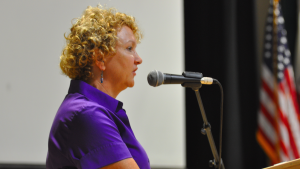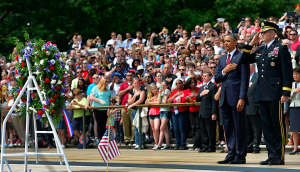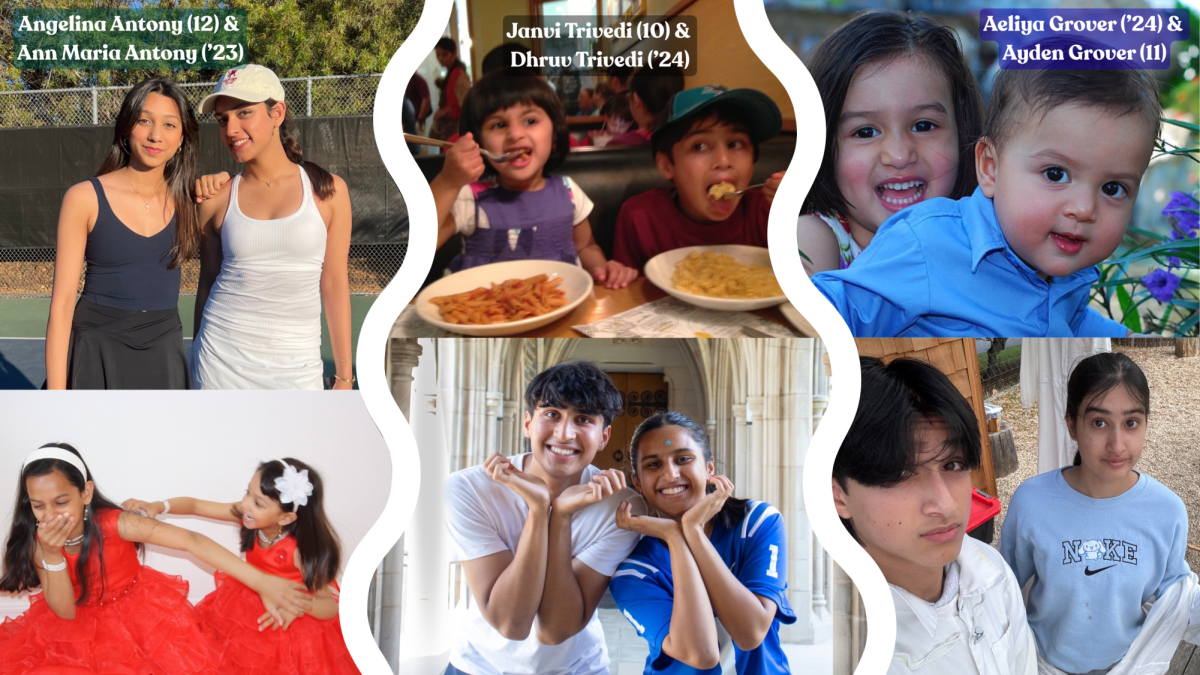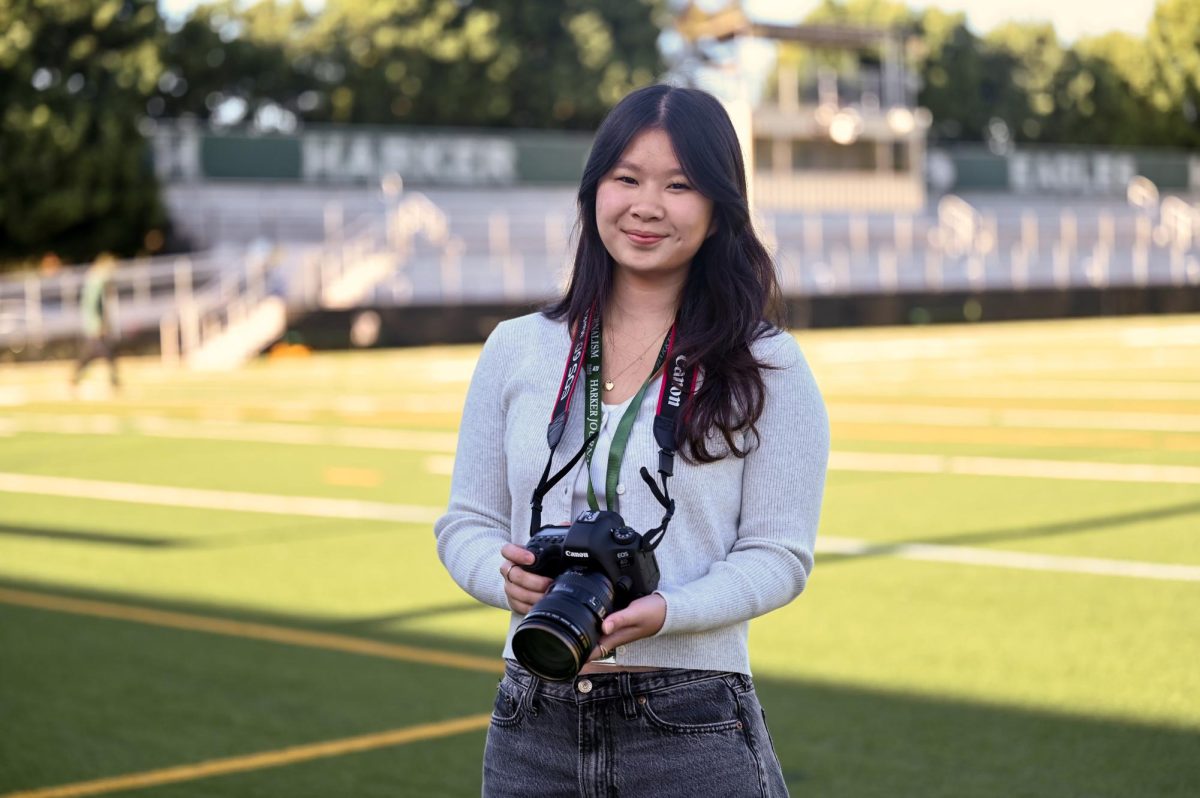A family in war and peace
Upper school history teacher reflects on her military career
November 19, 2019
“Sacrifice.”
When asked about a word to describe Veterans Day, the annual holiday on Nov. 11 honoring those who have served in the military, first-year upper school history teacher and retired U.S. Army Capt. Karen Haley recalls duty, honor, discipline and various other qualities her fellow soldiers embodied. But most of all, she remembers the sacrifice. Whether it was the courage of deployed infantry, the dedication of officers training at the bases or the support of military families, she identifies sacrifice as the underlying thread of her seven-year service in the U.S. Army.
Haley first became interested in the Reserved Officers’ Training Corps (ROTC), a college and university training program for future commissioned officers, during her freshman year in college. Growing up, her father was a World War II veteran, and Haley recalls his incredible discipline and reputation as a “well-distinguished man,” highlighted in black-and-white photographs of him in uniform.
After she brought up the possibility of joining the ROTC, he encouraged her to attend an informational meeting. Though Haley loved the chance to participate in physical training, which took members jogging around her dorm at 5 a.m., joining the program also meant taking extra courses in military history, foreign languages and land navigation on top of her usual workload. And out of all the ROTC at James Madison University, she had yet to see a female officer. The program had been admitting female officers for less than 20 years, and her college campus was no exception. Despite the demographic, Haley joined the ROTC after the informational meeting. She was able to balance the demands of a college student and the physical as well as academic demands of a training military officer and was commissioned immediately for the U.S. Army after completing the program.
“I saw them running around campus or I would see them training and doing rock climbing, repelling off of buildings, I loved that,” Haley said. “But it was absolutely male-dominated on my college campus. I didn’t really let that deter me, because I thought, ‘So they’re running in boots … I know I can do that.’”
Haley’s first assignment took her to Fort Benjamin Harrison in Indianapolis, where she practiced Field Training Exercises (FTX) along with training use of firearms, including pistols, rifles and a grenade launcher. After completing the requisite beginning training, she rose from a Second Lieutenant to a Captain under the 80th Training Command, a unit of the US.\ Army Reserve. Soldiers also branched off into fields such as law or engineering based on their expertise, and Haley was assigned to the role of Adjutant General (AG), a military chief administrative officer. During the span of her service, Haley played a role in preparing infantry for Operation Desert Storm, an initiative in the Persian Gulf War from Aug. 2, 1990 to Feb 28, 1991 in response to Sadam Hussein’s invasion of Kuwait.
“[That mission was] when you know this is real,” Haley said. “You serve; you sign up to defend your country and be there for your country in peacetime and wartime. I’m AG, so I get a lot of the preparation, the mobilization for soldiers that were being deployed for Desert Storm.”
One element of active duty especially striking to her was the constant uncertainty and shifting circumstances. In a military setting, any previously determined battle strategy was liable to change depending on the enemy’s actions. Unlike the relative predictability of a desk job, Haley’s job of preparing soldiers for a war zone involved fluidly modifying a plan and improving their ability to efficiently execute a decision.
“I felt that during those seven years, I would never think of the word ‘fear,’” Haley said. “This is the situation; I need to execute it. Even if it’s something that’s daunting, this is what I’m looking at. What’s the best plan? What’s the best course of action? Do I have supplemental forces, do I have resources that I can utilize?”
Haley’s work as an AG at Fort Benjamin Harrison and eventually Fort Ord in Monterey, California, and Fort Baker in Sausalito, California, where she has only recently returned to this year, required her to coordinate promotions, deployments, dental records, x-rays and even life insurance. She also acted as a liaison for the families of those who had been deployed and the infantry as Haley realized that military families required the same degree of support as the soldiers themselves, whether it was counseling to address symptoms of post-traumatic stress disorder (PTSD) or coping with possibly fatal casualties.
“We typically look at the soldier; we look at the troops, the brigade, the division,” Haley said. “You don’t really think about who’s at home. That’s actually someone’s son or daughter. That’s someone’s spouse.”
Having a member of the family either overseas or often away is a challenge reflected in many military families, and Haley’s situation was no exception. Haley was married three weeks after receiving her first assignment, and due to the long work hours, she found it difficult to juggle raising two young children with the demands of a captainship.
“It was really hard for child care because most people will say, ‘Hey, I need a sitter for 7 in the morning to 4,’ like normal hours,” Haley said. “That is not the case for the military. It was like, ‘Actually, I need you to come to my house at 2:30 in the morning, because I have to be out maybe 5 a.m.’”
After seven years of service, from 1986 to 1992, Haley decided to return to civilian life before nearly receiving a promotion to Major. Despite the years that have passed since her military career, she remains proud of her service to her nation.
“When you go through adversity with friends, family, coworkers, it really becomes a family,” Haley said. “If I have on a hat or my army T-shirt, just random people I don’t even know [will say] ‘Oh, where did you serve?’ It’s like a family, and that’s really special.”


















![“[Building nerf blasters] became this outlet of creativity for me that hasn't been matched by anything else. The process [of] making a build complete to your desire is such a painstakingly difficult process, but I've had to learn from [the skills needed from] soldering to proper painting. There's so many different options for everything, if you think about it, it exists. The best part is [that] if it doesn't exist, you can build it yourself," Ishaan Parate said.](https://harkeraquila.com/wp-content/uploads/2022/08/DSC_8149-900x604.jpg)




![“When I came into high school, I was ready to be a follower. But DECA was a game changer for me. It helped me overcome my fear of public speaking, and it's played such a major role in who I've become today. To be able to successfully lead a chapter of 150 students, an officer team and be one of the upperclassmen I once really admired is something I'm [really] proud of,” Anvitha Tummala ('21) said.](https://harkeraquila.com/wp-content/uploads/2021/07/Screen-Shot-2021-07-25-at-9.50.05-AM-900x594.png)







![“I think getting up in the morning and having a sense of purpose [is exciting]. I think without a certain amount of drive, life is kind of obsolete and mundane, and I think having that every single day is what makes each day unique and kind of makes life exciting,” Neymika Jain (12) said.](https://harkeraquila.com/wp-content/uploads/2017/06/Screen-Shot-2017-06-03-at-4.54.16-PM.png)








![“My slogan is ‘slow feet, don’t eat, and I’m hungry.’ You need to run fast to get where you are–you aren't going to get those championships if you aren't fast,” Angel Cervantes (12) said. “I want to do well in school on my tests and in track and win championships for my team. I live by that, [and] I can do that anywhere: in the classroom or on the field.”](https://harkeraquila.com/wp-content/uploads/2018/06/DSC5146-900x601.jpg)
![“[Volleyball has] taught me how to fall correctly, and another thing it taught is that you don’t have to be the best at something to be good at it. If you just hit the ball in a smart way, then it still scores points and you’re good at it. You could be a background player and still make a much bigger impact on the team than you would think,” Anya Gert (’20) said.](https://harkeraquila.com/wp-content/uploads/2020/06/AnnaGert_JinTuan_HoHPhotoEdited-600x900.jpeg)

![“I'm not nearly there yet, but [my confidence has] definitely been getting better since I was pretty shy and timid coming into Harker my freshman year. I know that there's a lot of people that are really confident in what they do, and I really admire them. Everyone's so driven and that has really pushed me to kind of try to find my own place in high school and be more confident,” Alyssa Huang (’20) said.](https://harkeraquila.com/wp-content/uploads/2020/06/AlyssaHuang_EmilyChen_HoHPhoto-900x749.jpeg)












